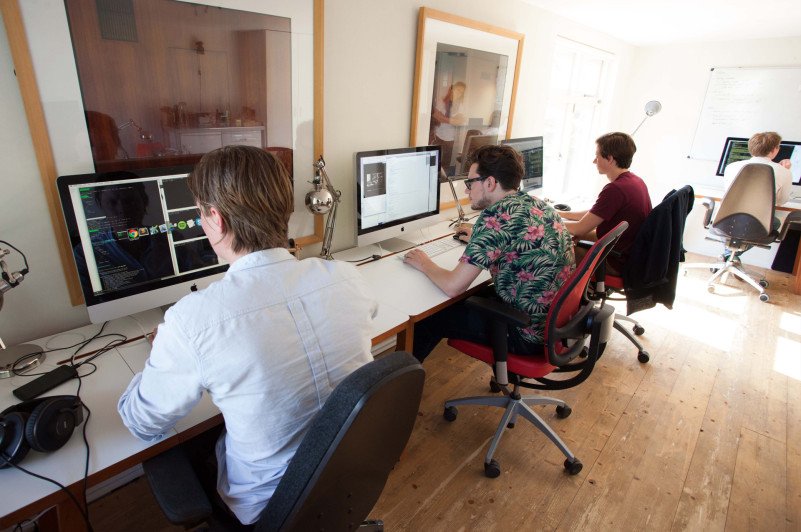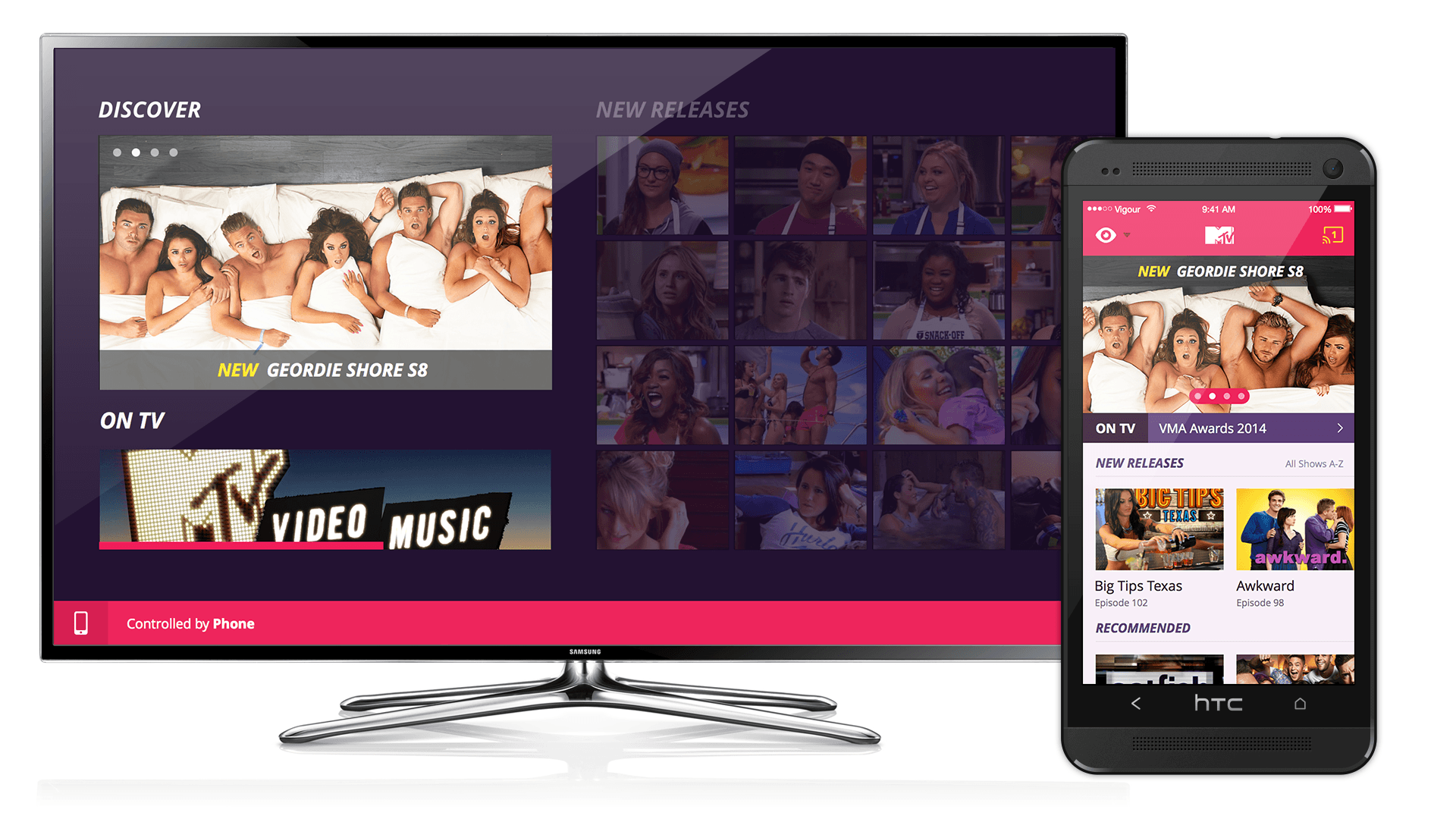Aside from shining a light on some of Europe’s finest bootstrapped technology companies, we’ve also kicked off the ‘Startup Spotlight’ series featuring relatively under-the-radar but interesting European tech startups on a weekly basis.
This time we shine a light on Amsterdam and Berlin-based multiscreen technology startup Vigour, which recently announced a partnership with MTV that lets viewers connect to MTV Play on various screens and easily switch between devices.
Here's a Q&A with Ramon Duivenvoorden, co-founder and CEO of Vigour, on how the team is improving the way users interact multiple connected screens, what it was like to negotiate a deal with MTV and how he balances work and life.
tech.eu: How would you describe Vigour and your vision in a couple of lines?

Ramon Duivenvoorden: We're changing the digital entertainment experience across all screens using a concept we call ‘contextual multiscreen’. Today, content has become available through a myriad of platforms (like TVs, mobile, web, consoles, etc.), but ‘multiscreen’ hasn't really gone beyond being accessible through multiple screens. We believe there's an enormous opportunity to revolutionise content consumption by connecting the devices users have in their homes already and treating multiple screens screens as a single canvas.
To turn this vision into reality, we developed a specialised technology and a white-label platform, called Vigour Video, that integrates contextual experiences into the video services of media companies and operators.
What would you say is the main thing that makes Vigour different from other players in this space?
There are various companies in the industry that offer second screen experiences or remote control apps as an add-on to a core service, but all of these experiences have been created as an afterthought.
The Vigour Video platform transcends the existing concept of ‘first’ and ‘second’ screen interfaces and automatically changes the behaviour of devices based on the context of the user. Video services that use Vigour Video are available through standalone apps running on all platforms, but when you use multiple devices in your environment your standalone experience is extended automatically.
A mobile phone or tablet adds convenience to content discovery and offers remote control when combined with a big screen. The big screen in turn offers the screen real estate to enrich navigation and discovery or playback video content.
Where did the idea for the startup originally come from?
We worked on an innovation project with KPN, a Dutch telecommunications company, and were asked to re-imagine how people could interact with their video content now that the living room TV is no longer the centre of the entertainment universe. We were convinced that people would ultimately expect their devices to become windows into a universal content experience and started building our technology platform to target all different screens using a single codebase.
Then we started thinking about the context of screens in a fragmented digital world, and the endless possibilities once you can truly merge the different capabilities of your devices (available screen size, touch navigation, etc.) into a single experience. The resulting technology platform is the core driver behind our Vigour Video product.
How did you meet your co-founders? What were you all doing before starting the company?
We started out as high school friends. My technical co-founders Jim de Beer and Marcus Besjes are developers that started coding at a young age and ran their first development business out of high school. I got involved on the commercial side while still in university and before we knew it we were earning serious money working a project with the largest Dutch operator.
Despite this early growth we learned that it was hard to fully focus on disruptive innovation within a complicated corporate environment. We got more and more enthusiastic about the potential of our technology and decided to go all in. I dropped out of my master studies and we all moved to Berlin, where we participated in the European startup accelerator program of Startupbootcamp and later raised our seed financing.

What was it like working with MTV? How did the partnership come about?
I believe every successful partnership starts with people. I was introduced to a senior executive at Viacom (MTV) by one of our advisory board members and we instantly clicked. He saw the potential of our platform and was excited about the opportunity. Back then we had a very simple, but cool demo, that many in the media industry seemed to be excited about.
However, replacing an existing video service (MTV UTT) with a new platform requires a lot of trust and courage, no matter how cool you think it is.
To gain their trust we offered to build a pilot that would show them how our platform could enhance their existing video service. They agreed, and during a month we built them a prototype based on our technology. This helped us gain traction within Viacom and broadened our understanding of their company’s culture, structure and business goals. When we had the final delivery of the prototype, the room was suddenly full of Viacom employees that had heard about this ‘cool’ project and wanted to see how it turned out. From that point on, it took us a couple more months to get a signed contract and then we started working on MTV Play, a new over-the-top platform that MTV recently launched in multiple European countries.
As a startup it can be hard to understand the timelines and decision making processes in large multinational companies, but our partnership with Viacom has been very rewarding.
Can you describe your experience in negotiating with them? What are some tips you would give to other entrepreneurs going through a similar process?
It’s always hard to negotiate with a large launching customer, mostly because you have few benchmarks and are very eager to make that important first step towards commercialising your product. Your potential customer might argue that they are taking a big risk when introducing a new platform and they usually understand the immense value they create for a startup. I think during this early stage of commercialisation, your main goal should be to get your technology in the hands of as many consumers as possible. Optimising revenue comes later. In the end it’s only fair to give your first customer a discount for supporting your market entry and taking that leap with you.
There are two important rules though. The first is to never work for free. It’s absolutely crucial that both parties make a real commitment to the project. The second rule is to make sure that any discount you give to a customer is transparent, limited and sustainable. It is important for your customer to realise it is an important stakeholder in your success, and as a business you need to generate revenue to become a healthy and reliable partner.
How much funding have you raised so far? Do you have plans to raise more?
We raised an initial €500,000 seed round in the early days of our company. This money enabled us to grow our team, develop our product and land our first implementations. Currently, our platform implementations generate revenues and enable us to potentially continue our growth organically.
Our technology is receiving interest from the global market, and we're working on additional funding rounds that will help us capture this momentum and further fuel our technical innovation and commercialisation.
What is your business model or future plan to monetize? Has your thinking on business model evolved since the start?
We charge our customers according to their monthly active users (MAU) on the Vigour Video platform. The price per user includes a technology license, use of our cloud service and service-level agreement (SLA). We experimented with a monthly model that measures and invoices the exact amount of MAUs per month, but found that our customers prefer to work with larger brackets and annual, rather than monthly, payments.
The great thing about our business model is the fact that it scales with the services of our clients, creating alignment and motivation for both parties to make new product introductions a success.

How do you maintain a balance between your personal and professional life?
Maintaining a healthy balance can be difficult, at times outright impossible. You can spend every waking hour at work and never run out of things to do. But every company has its cycles, and it is important to gain new energy after a busy peak.
I try to go away for a long weekend whenever I have the opportunity. Even though at times I wish I could lay in bed and do nothing at all, I get more energy and perspective when I spend a weekend skiing in the mountains or go out of town to meet with family and friends. It’s all about learning how to control your focus and channel your energy to the places it is needed most.
What's the company's plan for the next three months? And what do you hope to have achieved in 12 months?
In the long run, we want our platform to become the new standard for digital content consumption. With the introduction of MTV Play, our first Vigour Video-based service is now in the hands of consumers. Over the coming months we will be closely monitoring and adjusting the platform to continuously improve the quality of our product and it’s multiscreen user experience. At the same time we're working on exciting new implementations for other leading media companies.
One of the big decisions we've made is to be very selective in the customers we work with. Finding the right partners is the key to bringing our vision to the global market. If you manage to get the support of a select group of outstanding media companies, it’s only a matter of time before you reach the scale and numbers you need to make a lasting impact on the way we consume content across our screens.
The interview has been edited and condensed.
Read more from our Startup Spotlight series:



Would you like to write the first comment?
Login to post comments